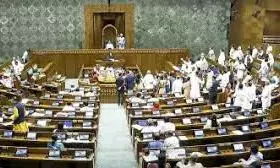AA Edit | Will new Waqf law create problems or solve them?
The first comprehensive act to deal with the management of the waqf properties was brought in only in 1995;

Legislatures make, unmake or amend laws to reflect the requirement of the times. While doing so, they are required to take a balanced approach to the issues they address in the larger context, instead of pushing a partisan agenda. The legislature cannot randomly swing the pendulum to one side in one moment, and the other the next. Such an approach does no good for society; especially one like India with its myriad diversities. Unfortunately, this happens in this country quite often.
The first comprehensive act to deal with the management of the waqf properties was brought in only in 1995. Waqf, as per the definition in the law, means the permanent dedication by any person, of any movable or immovable property for any purpose recognised by the Muslim law as pious, religious or charitable. Since it is made as a permanent deal with a religious purpose, the role of the secular state should be limited to ensuring that the property is managed as per the wishes of the person who dedicates it. The 1995 Act, however, went beyond this brief and vested quasi-judicial powers with the Waqf Boards, which are essentially a body comprising only Muslims. Section 40 of the Act authorised the boards to collect information regarding any property which it has reason to believe to be waqf property and decide the question. The boards also had the power to direct the district magistrates to implement their decisions. This is akin to the boards becoming the complainant, investigator, jury and judge, which is at variance with the principles and practices of Indian jurisprudence.
This power has caused misery to a large number of people, Muslims and non-Muslims alike, across the country and needed to be changed. The new law scraps this section fully, and the boards will now have to prove its case before a government official if it were to take possession of the property. The provision allowing appeals against the order to high court in 90 days is also welcome.
Under the guise of righting this wrong, and mitigating several others, the NDA government has undermined a number of settled legal principles and even the Constitution by bringing in the Waqf (Amendment) Bill, 2025. Most unsettling is the structure of the Central Waqf Council and State Waqf Boards as defined in the new bill. While the earlier law would have only Muslims in these bodies which are to manage properties that are dedicated to purposes sanctioned by Islamic faith, the new one has mandated that they have non-Muslims as members on the specious plea that it would make them more efficient. From the looks of it, the bill violates Article 26 (c) and (d) of the Constitution, which allow every religious denomination to own and acquire movable and immovable property; and to administer such property in accordance with law. This is an unwarranted interference in the running of a religious minority in the country, as is the limiting the right to donate property as waqf to only persons who have been practising Islam for five years.
The provision that empowers a government official to decide the waqf nature of a property, instead of a tribunal, is also unsustainable as disputes should be settled as per the tenets of the civil law, not administrative law. Given a new-found urge among the Hindu zealots to look for a religious symbol under very prominent Muslim place of worship, and the tendency to defy the mandates of the Places of Worship Act, 1991, there is a justifiable fear among the Muslims if this law could be used as a ruse to divest them of their properties, as several of them were previously covered by the now scrapped “waqf by user” provision.
The new bill has come as a mixed bag, liable to be questioned in court. It appears that it will serve the purpose of the ruling dispensation but it is to be seen if it solves more disputes than it could possibly generate.

